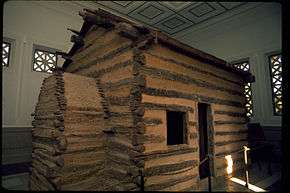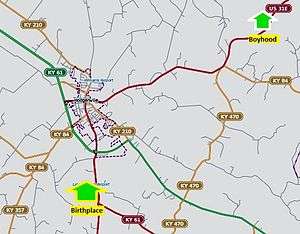Abraham Lincoln Birthplace National Historical Park
| Abraham Lincoln Birthplace National Historical Park | |
|---|---|
|
Memorial Building | |
 | |
| Location | LaRue County, Kentucky, USA |
| Coordinates | 37°31′53″N 85°44′10″W / 37.53139°N 85.73611°WCoordinates: 37°31′53″N 85°44′10″W / 37.53139°N 85.73611°W |
| Area | 344.50 acres (139.41 ha)[1] |
| Established | July 17, 1916 |
| Visitors | 169,515 (in 2012)[2] |
| Governing body | National Park Service |
| Website | Abraham Lincoln Birthplace National Historical Park |
Abraham Lincoln Birthplace National Historical Park preserves two separate farm sites in LaRue County, Kentucky where Abraham Lincoln was born and lived early in his childhood. He was born at the Sinking Spring site south of Hodgenville and remained there until the family moved to the Knob Creek Farm northeast of Hodgenville when he was two years old, living there until he was seven years old. The Sinking Spring site is the location of the park visitors center.
Sinking Spring
In the fall of 1808, Thomas and Nancy Lincoln settled on Sinking Spring Farm. Two months later on February 12, 1809, Abraham Lincoln was born there in a one-room log cabin. Today this site bears the address of 2995 Lincoln Farm Road, Hodgenville, Kentucky. A cabin, symbolic of the one in which Lincoln was born, is preserved within a 1911 memorial building at the site.
Also on the property is the privately owned Nancy Lincoln Inn.
Memorial Building
A Beaux-Arts neo-classical Memorial Building was designed by John Russell Pope for the birthplace site. In 1909 the cornerstone was laid by President Theodore Roosevelt and the building was dedicated in 1911 by President William Howard Taft.[3] Almost a hundred years after Thomas Lincoln moved from Sinking Spring Farm, a similar log cabin was placed inside the Memorial Building. The Memorial Building features 16 windows, 16 rosettes on the ceiling, and 16 fence poles, representing Lincoln being the 16th president. The 56 steps leading up to the building entrance represent his age at his death.[4]
The log cabin

The original log cabin that Lincoln was reputed to have been born in was dismantled sometime before 1865. Local tradition held that some of the logs from the cabin were used in construction of a nearby house. New York businessman A.W. Dennett purchased the Lincoln farm in 1894 and used the logs from this house to construct a cabin similar in appearance to the original cabin where Lincoln was born. Soon the cabin was dismantled and re-erected for exhibition in many cities. Eventually the logs for this cabin, along with logs incorrectly reputed to have belonged to Jefferson Davis' birthplace and possibly a third cabin, were purchased by the Lincoln Farm Association (LFA), which believed they had acquired only Lincoln logs. When workers tried to reconstruct the cabin, they discovered the problem. The LFA bought a one-room cabin similar to the one reconstructed by Dennett. When the last rebuilt cabin was placed in the Memorial Building, its size made visitor circulation difficult. The LFA reduced the cabin's size from 16-by-18 feet to 12-by-17 feet.
Today, historians recognize that the former claim that these logs were from Lincoln's birth cabin was essentially inaccurate. In his book It All Started With Columbus, satirical writer Richard Armour stated that Lincoln had been born in three states and also "in two cabins - the original, and the reconstructed."
Knob Creek

Lincoln lived at Sinking Spring until he was two years old, before moving with his family to another farm a few miles to the northeast along Knob Creek, near present-day U.S. Highway 31E, where he lived until the age of seven.
The Knob Creek site was added to the park in 2001. It features a 19th-century log cabin and a historic 20th century tavern and tourist site. The log cabin is not original to the site, but may have belonged to neighbors of the Lincolns. It was moved to the approximate location of the Lincolns' home. One of Abraham Lincoln's earliest memories was his near drowning in Knob Creek, and being saved by the neighbor's son.
Lincoln lived here until the age of seven, when his family moved to Indiana, to the site now commemorated as the Lincoln Boyhood National Memorial.
Administrative history
The original Memorial was constructed by the Lincoln Farm Association. In 1916, they donated the Memorial to the Federal government, which established the Abraham Lincoln National Park on July 17, 1916. The War Department administered the site until August 10, 1933, when it was transferred to the National Park Service. It was designated as the Abraham Lincoln National Historical Park on August 11, 1939. It was renamed and redesignated Abraham Lincoln Birthplace National Historic Site on September 8, 1959. As with all historic sites administered by the National Park Service, the site was listed on the National Register of Historic Places, effective on October 15, 1966. The historic site's definition was expanded to include the Knob Creek site on November 6, 1998.[3] On March 30, 2009, the two sites were again designated a National Historical Park.
Facilities
The Sinking Spring site, which contains the 1911 memorial has a visitors center museum, theater and bookstore. The Knob Creek site has interpretive staff during certain days in summer months. Both sites have hiking and picnic areas.[5]
See also
- United States Presidential Memorial
- Abraham Lincoln Statue (Kentucky)
- Lincoln Boyhood National Memorial, Indiana
References
Citations
- ↑ "Listing of acreage as of December 31, 2011". Land Resource Division, National Park Service. Retrieved 2012-03-30.
- ↑ "NPS Annual Recreation Visits Report". National Park Service. Retrieved 2013-12-23.
- 1 2 Robert W., Blythe; Maureen Carrol; Steven Moffson (July 2001). "Abraham Lincoln Birthplace National Historic Site: Historic Resource Study" (PDF). National Park Service. Retrieved 2008-02-13.
- ↑ Day, Teresa (Jan 30, 2005). Fun With the Family Kentucky: Hundreds of Ideas for Day Trips with the Kids. Globe Pequot. p. 34. Retrieved 2013-05-07.
- ↑ http://www.nps.gov/abli/planyourvisit/visitorcenters.htm
General references
- The National Parks: Index 2001–2003. Washington: U.S. Department of the Interior.
- Picone; Louis L. Where the Presidents Were Born: The History & Preservation of the Presidential Birthplaces (2012)
External links
| Wikimedia Commons has media related to Abraham Lincoln Birthplace National Historic Site. |
- Official NPS website: Abraham Lincoln Birthplace National Historical Park
- Map links
- Sinking Spring/birthplace: 37°31′52″N 85°44′15″W / 37.53111°N 85.73750°W
- Knob Creek/boyhood home: 37°36′41″N 85°38′18″W / 37.61139°N 85.63833°W



